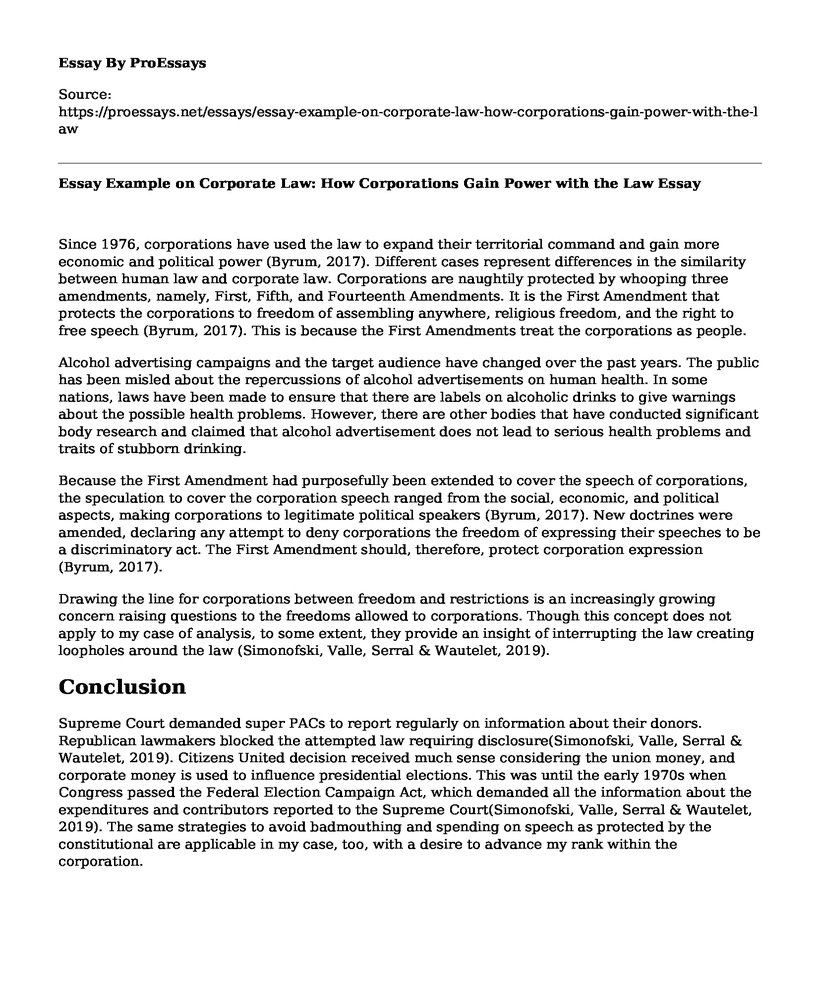Since 1976, corporations have used the law to expand their territorial command and gain more economic and political power (Byrum, 2017). Different cases represent differences in the similarity between human law and corporate law. Corporations are naughtily protected by whooping three amendments, namely, First, Fifth, and Fourteenth Amendments. It is the First Amendment that protects the corporations to freedom of assembling anywhere, religious freedom, and the right to free speech (Byrum, 2017). This is because the First Amendments treat the corporations as people.
Alcohol advertising campaigns and the target audience have changed over the past years. The public has been misled about the repercussions of alcohol advertisements on human health. In some nations, laws have been made to ensure that there are labels on alcoholic drinks to give warnings about the possible health problems. However, there are other bodies that have conducted significant body research and claimed that alcohol advertisement does not lead to serious health problems and traits of stubborn drinking.
Because the First Amendment had purposefully been extended to cover the speech of corporations, the speculation to cover the corporation speech ranged from the social, economic, and political aspects, making corporations to legitimate political speakers (Byrum, 2017). New doctrines were amended, declaring any attempt to deny corporations the freedom of expressing their speeches to be a discriminatory act. The First Amendment should, therefore, protect corporation expression (Byrum, 2017).
Drawing the line for corporations between freedom and restrictions is an increasingly growing concern raising questions to the freedoms allowed to corporations. Though this concept does not apply to my case of analysis, to some extent, they provide an insight of interrupting the law creating loopholes around the law (Simonofski, Valle, Serral & Wautelet, 2019).
Conclusion
Supreme Court demanded super PACs to report regularly on information about their donors. Republican lawmakers blocked the attempted law requiring disclosure(Simonofski, Valle, Serral & Wautelet, 2019). Citizens United decision received much sense considering the union money, and corporate money is used to influence presidential elections. This was until the early 1970s when Congress passed the Federal Election Campaign Act, which demanded all the information about the expenditures and contributors reported to the Supreme Court(Simonofski, Valle, Serral & Wautelet, 2019). The same strategies to avoid badmouthing and spending on speech as protected by the constitutional are applicable in my case, too, with a desire to advance my rank within the corporation.
References
Byrum, K. (2017). The European right to be forgotten: A challenge to the United States Constitution's First Amendment and to professional public relations ethics. Public Relations Review, 43(1), 102-111. DOI:10.1016/j.pubrev.2016.10.010
Simonofski, A., Valle, T., Serral, E., & Wautelet, Y. (2019). Investigating context factors in citizen participation strategies: A comparative analysis of Swedish and Belgian smart cities. International Journal of Information Management, 102011.DOI:10.1016/j.ijinfomgt.2019.09.007
Cite this page
Essay Example on Corporate Law: How Corporations Gain Power with the Law. (2023, Jun 11). Retrieved from https://proessays.net/essays/essay-example-on-corporate-law-how-corporations-gain-power-with-the-law
If you are the original author of this essay and no longer wish to have it published on the ProEssays website, please click below to request its removal:
- Drivers of Internationalization of Business - Essay Sample
- Western Sectoral Sanctions on Russian Oil Industry Paper Example
- Business Ethics: Can Ethics Be Taught? - Argumentative Essay
- Examining BOH Tech Utilization in US Restaurants - Essay Sample
- Essay Sample on International Business Machine Corporation: Global Tech Giant and Its Crucial Issues
- Essay Example on Business Law & Ethics: Case Studies & Applications
- Lee Plaza: Once an Iconic Luxury Hotel of the USA - Essay Sample







